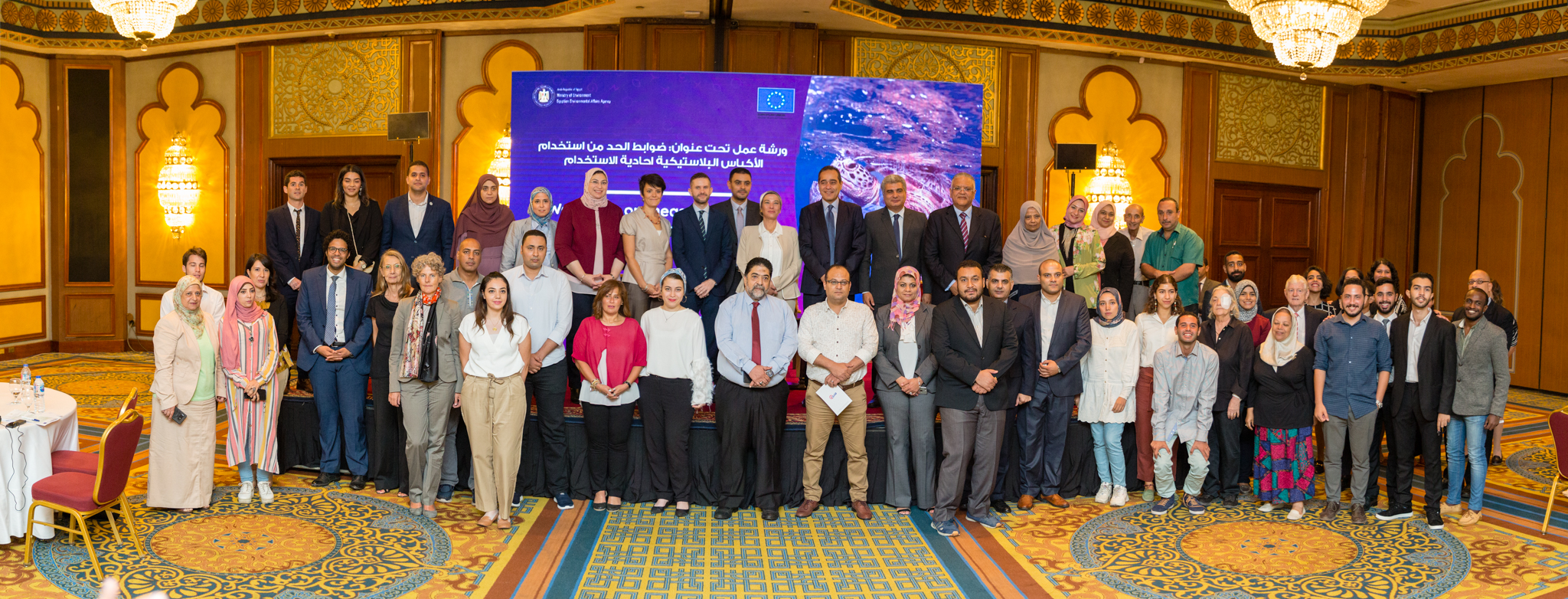

Subscriu-te al SCP News
SCP/RAC provided tailored support to five Mediterranean countries in fighting against single-use plastic items

- SCP/RAC provided technical assistance to the governments of Tunisia, Egypt and Lebanon on phasing out single-use plastic bags, and to Morocco and Algeria in implementing extended producer responsibility to plastic packaging.
- Four national events were held to explain and enrich the results, as well as gaining engagement for the next steps of implementation.
- This work allowed countries to fulfil their obligations in the implementation of the Barcelona Convention Regional Plan on Marine Litter Management in the Mediterranean.
- The activities are framed within the Marine Litter Med project, funded by the EU.
SCP/RAC has worked over the last 3 years in providing support to non-EU countries in implementing measures against marine litter, particularly addressing single-use plastic bags and food and beverage packaging through extended producer responsibility (EPR). Through a consultation phase, Tunisia, Egypt, Lebanon, Morocco and Algeria expressed willingness to receive support from SCP/RAC.
Addressing single-use plastic bags
SCP/RAC has extensively work on the identification of policies measures to reduce single-use plastic bags in the Mediterranean as well as on promoting sound alternatives. This is well captured by the Guidelines to phase out single-use plastic bags in the Mediterranean, recently approved by the COP21 of the Barcelona Convention.

In Tunisia, the Ministry of Local Affairs and the Environment has worked over the last years in a draft decree to ban conventional plastic bags, to be mostly substituted by reusable plastic bags as well as compostable bags. The text is at the final stage of approval. In close collaboration with the Ministry, SCP/RAC and associated have worked in different aspects in order to prepare the legal and technical framework as a consequence of the entry into force of the decree fixing the types of plastic bags whose production, import, distribution and possession are prohibited on the domestic market (still at last stages of approval). This work comprised the development of an application decree providing criteria and tests for the evaluation of biodegradable bags, legal aspects of the import of biodegradable bags as well as the reform of industrial norms for plastic bags. The results were presented in a dedicated event in Tunis, 3rd October 2019. Download the report of activities and national event.
In Egypt, following a parliamentarian proposal to ban single-use plastic bags and the preparation by the Ministry of Environment of a roadmap to regulate plastics bags, SCP/RAC organized a multi-stakeholders consultation national event (Cairo, 17th September 2019). The Minister took part at the event which raised great attention, including from the media. It was an occasion for the Ministry of Environment to present the legislative proposal and discuss with key stakeholders (industries, retailers, entrepreneurs, other Ministries, CSOs…) on the feasibility and implementation modalities. SCP/RAC presented in detail the guidelines to phase-out single-use plastic bags, which provided room for complementing planned national action. A discussion round-table served to hear the position from different stakeholders, and it was particularly important the discussion on which alternatives should be promoted. This made clear that serious misconceptions remain with regards to the notions of biodegradability of certain plastics and that further actions should in undertaken in this respect in the Region. Finally, the event was the occasion to announce and promote the two winners of the plastic bags business challenge, promoted by SCP/RAC through a funding agreement with UNEP/GPA.
See the video, pictures and report of the event.
 Photo: Youthinkgreen
Photo: Youthinkgreen
In Lebanon, following the announcement of the Municipality of Jbeil to ban single-use plastic bags as from January 2019, SCP/RAC proposed to focus the work in this municipality as a pilot project that could serve to develop national policy. The activities included a survey with local population, retailers, industry and national government to have a clear view on the current situation and find the most suitable way to address single-use plastic bags. An online repository for storing and visualizing the results from 316 surveys with consumers and 52 SMEs in the Jbeil area was created. This online repository was coded in the belief that data analysis should be democratized. Additionally, an estimation of the amount of plastic bags being consumed in the country was done. Lebanese consumption of single use plastic bags in 2017 according to the method used was 4.62 billion bags, which computes to 673 bags per person per year.
The Ministry of Environment welcomed the study and acknowledged the convenience of such information in the light of developing measures to reduce single-use plastic bags. The complex political situation in the country prevented the team organizing an event where these results would have been discussed as well as a policy roadmap to abate consumption of plastic bags. However, good outreach was achieved through a news article.
Addressing food and beverage plastic packaging through EPR
It is well known that these items, including plastic bottles and lids and food wrappers and containers among others, often end up as marine litter. EPR has proven to be an effective instrument to abate this issue by providing incentives and means to boost collection and recycling.
In Morocco, the objective of the technical assistance was to integrate the principle of EPR in Morocco, particularly concerning packaging waste, with special emphasis on plastic packaging waste. For this, the consultants reviewed the current waste policy and management in the country, developed a benchmark relevant to the national context, explained the different management options and proposed two scenarios for the adoption of EPR in Morocco. The scenarios correspond to either the reform of the existing ecotax on plastics, or to develop a complementary EPR scheme. The national event (Rabat, 26th September 2019) took the shape of an internal meeting with different departments of the SSSD to present the results and decide on the way forward. It was agreed that the complementary EPR scheme would make more sense. Based on this meeting, the consultants concluded the study with a roadmap for the country, indicating the next steps towards the adoption of EPR.
In Algeria, the work consisted in assessing the technical and economic feasibility of an Extended Producer Responsibility Initiative (EPRI) in the Wilaya of Oran. This initiative consists on launching a voluntary pilot initiative of extended producer responsibility to create and implement a model for the selective collection of PET plastic bottles waste financed by beverage producers. This study assessed the desired economic contribution of producers to enhance the management of post-consumer waste. The experts assessed the current situation of the beverage packaging collection and recycling circuit in the Willaya of Oran. Next, based on an international benchmark, a proposal is made on the economic contribution of producers to the collection-recycling system and how such contribution should be managed. It is proposed that the Algerian Association of Beverage Producers (APAB) could manage the contribution of producers, hence acting as a Producer Responsibility Organisation (PRO). These contributions would be paid to the recycling companies provided proof of recycled quantities is reported. In turn, recyclers would transfer the contribution to recognized collectors, being the ultimate goal of the system to increase sorting of waste at source. Finally, a national event (Oran, 2nd December 2019) was the opportunity to explain and discuss on the model. There was a general agreement, and APAB expressed commitment in discussing the model among its members. Once formal feedback is provided, it is envisaged to move to the implementation phase, in which SCP/RAC was asked to keep providing support.
Download the study and event report.
More information
This work was part of the Marine Litter Med project. The overall objective of this EU-funded project was to support UNEP-MAP/Barcelona Convention and its Contracting Parties to prevent and manage marine litter through the implementation of the Marine Litter Regional Plan adopted by COP 18 of the Barcelona Convention and its Protocols, Istanbul, 2013.
The work has been implemented by the Regional Activity Centre for Sustainable Development and Production (SCP/RAC) and associated experts. SCP/RAC has an official mandate from the Contracting Parties to the Barcelona Convention to engage in international cooperation with Mediterranean countries on the prevention of plastic pollution, including marine litter and on the development and innovation in the business sector.
DESCÀRREGUES
Altres documents:














